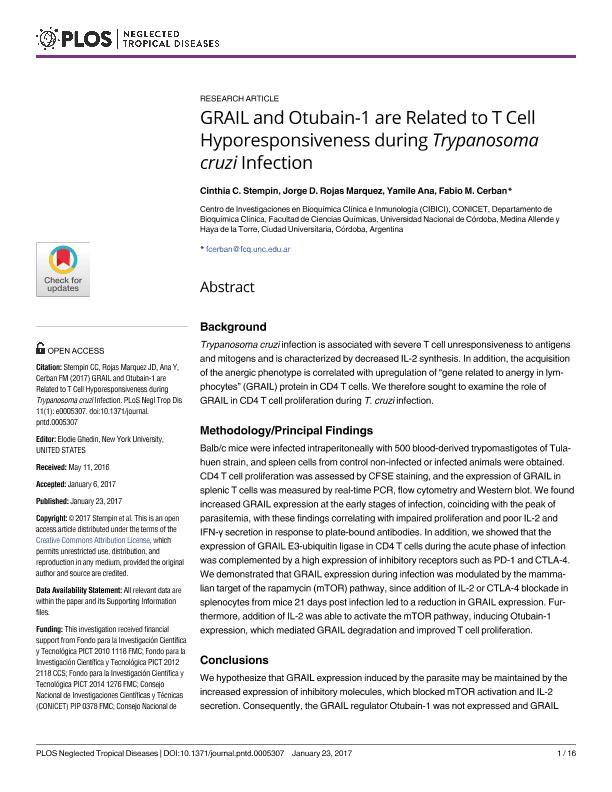Mostrar el registro sencillo del ítem
dc.contributor.author
Stempin, Cinthia

dc.contributor.author
Rojas Marquez, Jorge David

dc.contributor.author
Ana, Yamile

dc.contributor.author
Cerban, Fabio Marcelo

dc.date.available
2018-12-06T13:23:25Z
dc.date.issued
2017-01
dc.identifier.citation
Stempin, Cinthia; Rojas Marquez, Jorge David; Ana, Yamile; Cerban, Fabio Marcelo; GRAIL and Otubain-1 are Related to T Cell Hyporesponsiveness during Trypanosoma cruzi Infection; Public Library of Science; PLoS Neglected Tropical Diseases; 11; 1; 1-2017
dc.identifier.issn
1935-2727
dc.identifier.uri
http://hdl.handle.net/11336/65959
dc.description.abstract
Trypanosoma cruzi infection is associated with severe T cell unresponsiveness to antigens and mitogens and is characterized by decreased IL-2 synthesis. In addition, the acquisition of the anergic phenotype is correlated with upregulation of “gene related to anergy in lymphocytes” (GRAIL) protein in CD4 T cells. We therefore sought to examine the role of GRAIL in CD4 T cell proliferation during T. cruzi infection. Methodology/Principal Findings: Balb/c mice were infected intraperitoneally with 500 blood-derived trypomastigotes of Tulahuen strain, and spleen cells from control non-infected or infected animals were obtained. CD4 T cell proliferation was assessed by CFSE staining, and the expression of GRAIL in splenic T cells was measured by real-time PCR, flow cytometry and Western blot. We found increased GRAIL expression at the early stages of infection, coinciding with the peak of parasitemia, with these findings correlating with impaired proliferation and poor IL-2 and IFN-γ secretion in response to plate-bound antibodies. In addition, we showed that the expression of GRAIL E3-ubiquitin ligase in CD4 T cells during the acute phase of infection was complemented by a high expression of inhibitory receptors such as PD-1 and CTLA-4. We demonstrated that GRAIL expression during infection was modulated by the mammalian target of the rapamycin (mTOR) pathway, since addition of IL-2 or CTLA-4 blockade in splenocytes from mice 21 days post infection led to a reduction in GRAIL expression. Furthermore, addition of IL-2 was able to activate the mTOR pathway, inducing Otubain-1 expression, which mediated GRAIL degradation and improved T cell proliferation. Conclusions: We hypothesize that GRAIL expression induced by the parasite may be maintained by the increased expression of inhibitory molecules, which blocked mTOR activation and IL-2 secretion. Consequently, the GRAIL regulator Otubain-1 was not expressed and GRAIL maintained the brake on T cell proliferation. Our findings reveal a novel association between increased GRAIL expression and impaired CD4 T cell proliferation during Trypanosoma cruzi infection.
dc.format
application/pdf
dc.language.iso
eng
dc.publisher
Public Library of Science
dc.rights
info:eu-repo/semantics/openAccess
dc.rights.uri
https://creativecommons.org/licenses/by-nc-sa/2.5/ar/
dc.subject
Linfocito
dc.subject
Trypanosoma
dc.subject
Anergia
dc.subject
Grail
dc.subject.classification
Salud Ocupacional

dc.subject.classification
Ciencias de la Salud

dc.subject.classification
CIENCIAS MÉDICAS Y DE LA SALUD

dc.title
GRAIL and Otubain-1 are Related to T Cell Hyporesponsiveness during Trypanosoma cruzi Infection
dc.type
info:eu-repo/semantics/article
dc.type
info:ar-repo/semantics/artículo
dc.type
info:eu-repo/semantics/publishedVersion
dc.date.updated
2018-10-23T21:36:37Z
dc.identifier.eissn
1935-2735
dc.journal.volume
11
dc.journal.number
1
dc.journal.pais
Estados Unidos

dc.journal.ciudad
New York
dc.description.fil
Fil: Stempin, Cinthia. Universidad Nacional de Córdoba; Argentina. Consejo Nacional de Investigaciones Científicas y Técnicas. Centro Científico Tecnológico Córdoba. Centro de Investigaciones en Bioquímica Clínica e Inmunología; Argentina
dc.description.fil
Fil: Rojas Marquez, Jorge David. Universidad Nacional de Córdoba; Argentina. Consejo Nacional de Investigaciones Científicas y Técnicas. Centro Científico Tecnológico Córdoba. Centro de Investigaciones en Bioquímica Clínica e Inmunología; Argentina
dc.description.fil
Fil: Ana, Yamile. Universidad Nacional de Córdoba; Argentina. Consejo Nacional de Investigaciones Científicas y Técnicas. Centro Científico Tecnológico Córdoba. Centro de Investigaciones en Bioquímica Clínica e Inmunología; Argentina
dc.description.fil
Fil: Cerban, Fabio Marcelo. Universidad Nacional de Córdoba; Argentina. Consejo Nacional de Investigaciones Científicas y Técnicas. Centro Científico Tecnológico Córdoba. Centro de Investigaciones en Bioquímica Clínica e Inmunología; Argentina
dc.journal.title
PLoS Neglected Tropical Diseases
dc.relation.alternativeid
info:eu-repo/semantics/altIdentifier/doi/http://dx.doi.org/10.1371/journal.pntd.0005307
dc.relation.alternativeid
info:eu-repo/semantics/altIdentifier/url/https://journals.plos.org/plosntds/article?id=10.1371/journal.pntd.0005307
Archivos asociados
